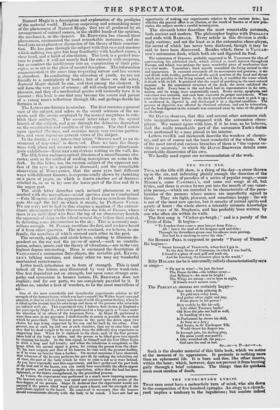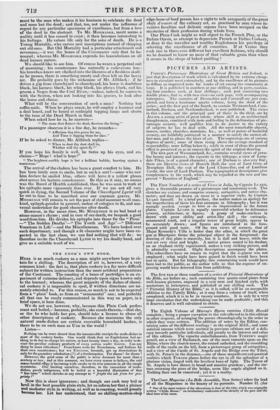THE CHURCHYARD LYRIST.
THAT man must have a melancholy turn of mind, who sits dowii to the composition of five hundred epitaphs. An elegy in a church- yard implies a tendency to the lugubrious; but sombre indee4 must be the man who makes it his business to celebrate the dead and none but the dead; and that, too, not under the influence of regret for any particular specimens of excellence, but from a love of the dead in the abstract. To Mr. MOGRIDGE, merit seems a nullity until it has ceased to exist ; it then becomes interesting to his feelings. He values life only for the sake of death. He is a Young Mortality, who carves new inscriptions instead of chipping out old ones. But Old Mortality had a particular attachment and reverence,—it was the bones of the Covenanter only that he ho- noured; whereas Mr. MOGRIDGE expends his lamentations on all dead human nature.
We should like to see him. Of course he wears a perpetual suit of mourning : his countenance has naturally a cadaverous hue : his breeches-knees are chalked into the likeness of a fleshless skull : as he passes, there is something musty and close left on the heavy air. He probably goes by the nickname of Mr. Allblack : if he drives a gig from churchyard to churchyard, his horse is doubtless black, his harness black, his whip black, his gloves black, and his groom a Negro from the Coal River,—unless, indeed, be contrarts with the Sexton, when not looking into his graves, to look after the horse and chaise.
What will be the conversation of such a man ? Nothing but coffin-nails. When he plays music, be will employ a hammer and a deal board, and be heard at midnight tapping longs and shorts to the tune of the Dead March in Saul.
When asked how he is, he answers-
" The stone that flatters the dead, deceives the living."
If a passenger observes it is a fine day, he remarks—
Affliction dug this grave for me, And Time is digging thine for thee."
If he be asked to dinner, Mr. Allblack replies- " When in dust thy dust shall lie, Whither will thy spirit fly ?"
If you hope his family is well, he thins up his eyes, and ex- claims—" Hope? what is hope?"
" The brightest earthly hope is but a brilliant bubble, bursting against a tombstone."
The arrival of the cholera has been a great comfort to him. He has been lately seen to smile, but in such a sort /—some who saw him declare he smiled blue, others will have it a yellow gleam shot across his lantern countenance. Be this as it may, no sooner was the Board of Health established, than be was seen to work at his epitaphs more vigorously than ever. If we are not all very quick in dying, the Second Volume of the Churchyard Lyrist will be out in time to be inscribed over our common graves. Mr. MOGRI DOE will remain to act the part of chief mourner to all. man- kind, epitaph-grinder in general, maker of eulogies to fit, and uni- versal undertaker for good character after death.
However, in the mean time, Mr. MOGRIDGE is no bad hand at stone-mason's rhyme ; and in case of our death, we bespeak a good word from him. He divides his epitaphs into those for the "Pious" —" The Sudden Deaths"—" The Youth and Age"—" Different Vocations in Life"—and the Miscellaneous. We have looked over each department; and though a fit character might have been ex- pected in the last class, we can find nothing that will do : we therefore invite the Churchyard Lyrist to try his deadly hand, and give us a suitable word of NVO.



























 Previous page
Previous page